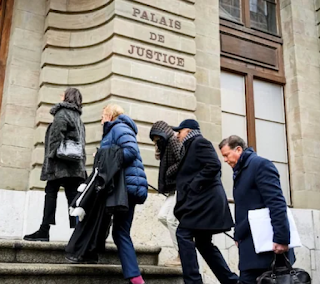Four members of the Hinduja family, known as Britain's wealthiest, are currently facing trial in Switzerland on charges of human trafficking. The allegations stem from claims that they severely underpaid an Indian domestic worker at their Lake Geneva residence, with accusations suggesting they spent more on their pet dog than on the worker's salary.
Prosecutors in the trial have presented several startling revelations, including the withdrawal of three additional plaintiffs from the case. The trial targets Prakash Hinduja, his wife Kamal, their son Ajay, and his wife Namrata. Despite vehement denials from the Hinduja family, if convicted, they could face up to five-and-a-half months in prison.
Prakash and Kamal Hinduja, aged 78 and 75 respectively, did not attend the trial, citing health reasons. Prosecutor Yves Bertossa criticized their absence, suggesting they could easily have made the short flight from Cannes to Geneva.
The prosecution has highlighted five key details against the Hindujas:
1. Disparities in Spending: It is alleged that while paying the Indian domestic help a mere seven Swiss francs for an 18-hour workday, the Hinduja family reportedly spent 8,584 francs annually on their pet dog.
2. Passport Confiscation: Prosecutors claim the Hinduja family confiscated the passport of the Indian domestic help, restricting their freedom of movement and alleging illegal practices related to bringing staff in and out of Switzerland.
3. Payment Issues: The prosecution asserts that the domestic help was paid in Indian currency while in India, leaving them with no access to Swiss francs and thereby limiting their freedom in Switzerland.
4. Extended Work Hours: The domestic help purportedly worked gruelling 18-hour shifts without specified work hours or days off, a claim contested by the defence as an exaggeration.
5. Settlements and Plaintiffs: The prosecution revealed that besides the ongoing trial, three other plaintiffs had previously withdrawn their civil suits against the Hindujas, opting for out-of-court settlements.
The defence has countered these allegations, arguing that the salaries paid do not reflect the overall compensation and benefits provided to the staff, who were also offered lodging. They further claim that the workers came willingly and returned repeatedly to the job, suggesting satisfaction with the conditions.
The outcome of this trial will have significant implications for the reputation and legal standing of the Hinduja family, amidst assertions and counter-assertions regarding their treatment of domestic staff at their Swiss residence.



